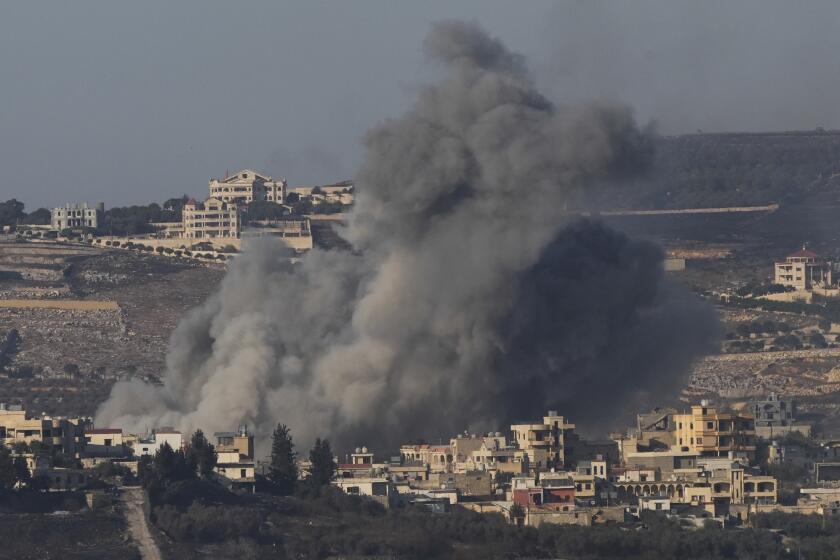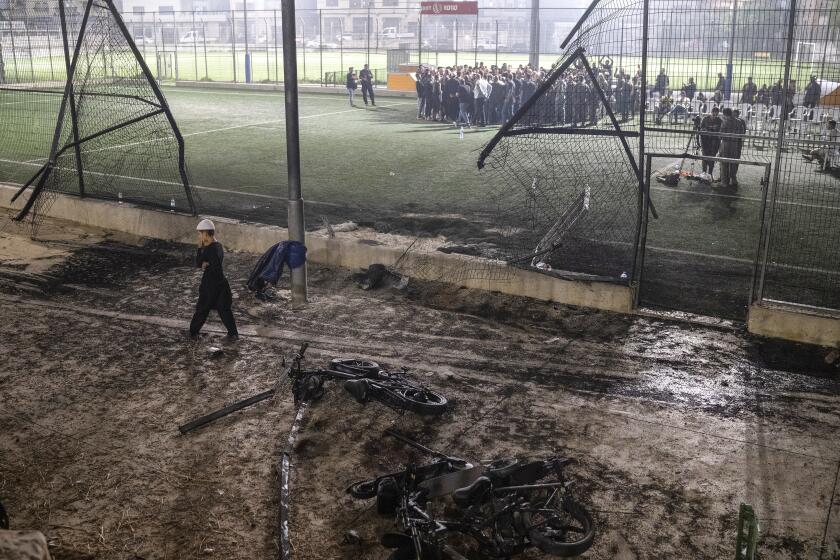60 S. African Black Police Stage Mutiny : 19 Held After Revolt Against White Commander, Gun Battle
About 60 black policemen mutinied against their white commander Thursday and then fought a gun battle with riot police called to put down their uprising.
Seven constables from the Leoka municipal police force in Sebokeng, about 35 miles south of Johannesburg, were wounded in the fighting, according to police headquarters in Pretoria, and 19 were arrested on charges of mutiny and attempted murder.
The mutiny apparently stemmed from longstanding grievances that the local policemen had about their commander and working conditions, but police spokesmen said in Pretoria that they were uncertain what led to the full-scale riot.
Broke Out of Compound
The local commander had just ordered a vehicle inspection when the policemen rebelled, got into their cars and trucks and attempted to run him down, according to a police statement.
When heavily armed riot police arrived, the constables broke out of the local police compound, opening fire with their pistols and shotguns, the statement said. The riot police fired back, using buckshot and tear-gas grenades, and eventually dispersed the local policemen. Order was restored later in the day, a police spokesman said.
Shed Uniforms and Flee
Many of the constables evaded arrest by shedding their uniforms and fleeing into Sebokeng, long one of the most volatile black townships in the country and the scene of the first serious political violence three years ago.
Residents said the constables, regarded by many in the community as collaborators and “sellouts” for working for the government, banged on doors asking for shelter from the pursuing riot police.
The incident was the latest in a series that have called into question the loyalty of black policemen and soldiers to the country’s white-led minority government.
With forces stretched thin by more than three years of civil unrest, by the stepped-up guerrilla attacks of the outlawed African National Congress and by the prolonged war in neighboring Namibia, Pretoria is now relying increasingly on blacks, both in the police and the army.
The expanded recruitment of blacks not only helps resolve an acute manpower shortage--whites now constitute less than 15% of South Africa’s population--but it is supposed to tighten the bonds of moderate and conservative blacks to the government.
Policy Being Undermined
Yet, recent incidents are undermining this whole policy, which is a central element in the government’s overall strategy of curbing unrest while proceeding with gradual reform.
More than 400 members of the South-West Africa Territorial Force in Namibia reportedly refused to fight in Angola last month in support of the rightist guerrillas of the National Union for the Total Liberation of Angola.
Military spokesmen, while disputing the size of this rebellion, acknowledged that 27 soldiers had “problems” with their deployment in Angola that were eventually resolved. Local press reports in Namibia said that 48 more had refused to obey orders and instead resigned from the volunteer force.
In the past year, municipal police have gone on strike, generally for higher pay and better working conditions, in six other black townships around Johannesburg.
In one case, the whole local police force of 115 was detained briefly under emergency regulations; in another, local constables clashed with riot police and were charged with public violence.
2 Convicted of Spying
And two black security policemen, convicted of spying for the African National Congress, were sentenced last week to 14 years in prison each. Senior police sources said that the pair, based in Pretoria, had provided the ANC with considerable sensitive material while letting ANC guerrillas and political cadres operate freely.
Three suspected ANC insurgents were killed and a fourth was seriously wounded early Thursday in a pre-dawn police raid on the shack where they were hiding in a shantytown outside the coastal city of Port Elizabeth.
More to Read
Sign up for Essential California
The most important California stories and recommendations in your inbox every morning.
You may occasionally receive promotional content from the Los Angeles Times.










